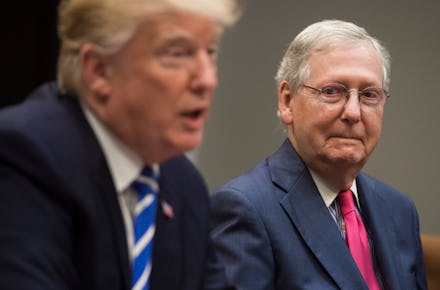Would firing Mueller really be “the beginning of the end” of Trump’s presidency?

President Donald Trump has been hostile toward the Russia probe from the get-go, but his fury over the FBI raid on his longtime attorney Monday has brought concerns that he may attempt to fire special counsel Robert Mueller to a fever pitch.
In recent days, Trump has termed the raid on Michael Cohen as an “attack on our country,” blamed the “conflicted” special counsel for poor relations between Washington and Moscow and reportedly raged against the top federal law enforcement officials — particularly Deputy Attorney General Rod Rosenstein, whom he is said to be considering terminating in what would almost certainly be taken as a dramatic threat to Mueller.
Democrats have renewed their calls for lawmakers to pass bipartisan legislation protecting the special counsel, but Senate Majority Leader Mitch McConnell told reporters Tuesday that he has not seen “a clear indication yet that we needed to pass something to keep him from being removed because I don’t think that’s going to happen.”
“That remains my view,” the Kentucky Republican said.
But what if he’s wrong? What if Trump does make a dramatic move against Mueller, either directly or via the removal of Rosenstein?
Lawmakers, experts warn of “constitutional crisis”
Democrats have made clear that they consider an attack on Rosenstein to be an attack on Mueller, as the deputy attorney general is widely considered to be the only person with the authority to directly fire the special counsel.
“I see Rosenstein as Mueller and Mueller as Rosenstein,” Rep. Eric Swalwell (D-Calif.) told Mic in a phone interview Thursday, saying that the special counsel would be “hobbled” if Trump were to terminate the deputy attorney general, who has overseen the FBI probe since attorney general Jeff Sessions recused himself in early 2017.
As such, Democrats — and even some Republicans — have warned that going after top federal law enforcement officials could trigger what Senate Minority Leader Chuck Schumer called a “constitutional crisis.”
But what would that mean?
According to Danielle Brian, executive director of the Project On Government Oversight, an attack on his investigators could spur lawmakers to attempt to remove Trump from office.
“That would absolutely be, from our perspective, a triggering event for the House to consider impeachment proceedings,” Brian said by phone on Thursday.
Sen. Lindsey Graham (R-S.C.), a cosponsor of a bipartisan bill to protect the special counsel introduced by Sen. Chris Coons (D-Del.) on Wednesday, has repeatedly cautioned as much.
“As I’ve said before, if he tried to [fire Mueller], that would be the beginning of the end of his presidency because we’re a rule of law nation,” Graham said on CNN in March.
That said, Republicans have shown a willingness to forgive Trump’s transgressions in the past despite their tough talk, leading Swalwell to worry that they’ll do the same if Trump defies lawmakers’ warnings.
“I’m afraid that they will not protect Mueller and will not hold the president accountable if he fired Mueller or Rosenstein,” Swalwell said.
Indeed, some of Trump’s allies, including Rep. Devin Nunes (R-Calif.), have stood by him so far, indicating that they’d support any action he would take on the probe.
But it’s worth remembering that Republicans largely stood by former President Richard Nixon throughout much of the Watergate scandal — until the release of the “smoking gun tape” revealing his role in the cover-up led enough of his party to abandon him that he would almost certainly be impeached.
According to Brian, Trump attempting to get rid of Mueller could cause a similar exodus, as she believes even Republicans would likely consider such a move to be a “red line.”
“I have confidence that if he were to take that step, you would see not just an uprising from people on the left, but you would see Republicans saying that this has gone too far,” Brian said.
Swalwell and Brian each expressed hope that it would not come to that point, though, telling Mic that it would be best for lawmakers on Capitol Hill to pass legislation protecting not just Mueller, but future special counsels.
“Right now, these guys are looking at a burning building and saying, ‘Let’s hold off on sending the fire department; maybe the fire will put itself out,’” Swalwell said. “For a president to be able to fire his investigator, that is outside of what is acceptable in the United States and we just cannot allow that to happen.”